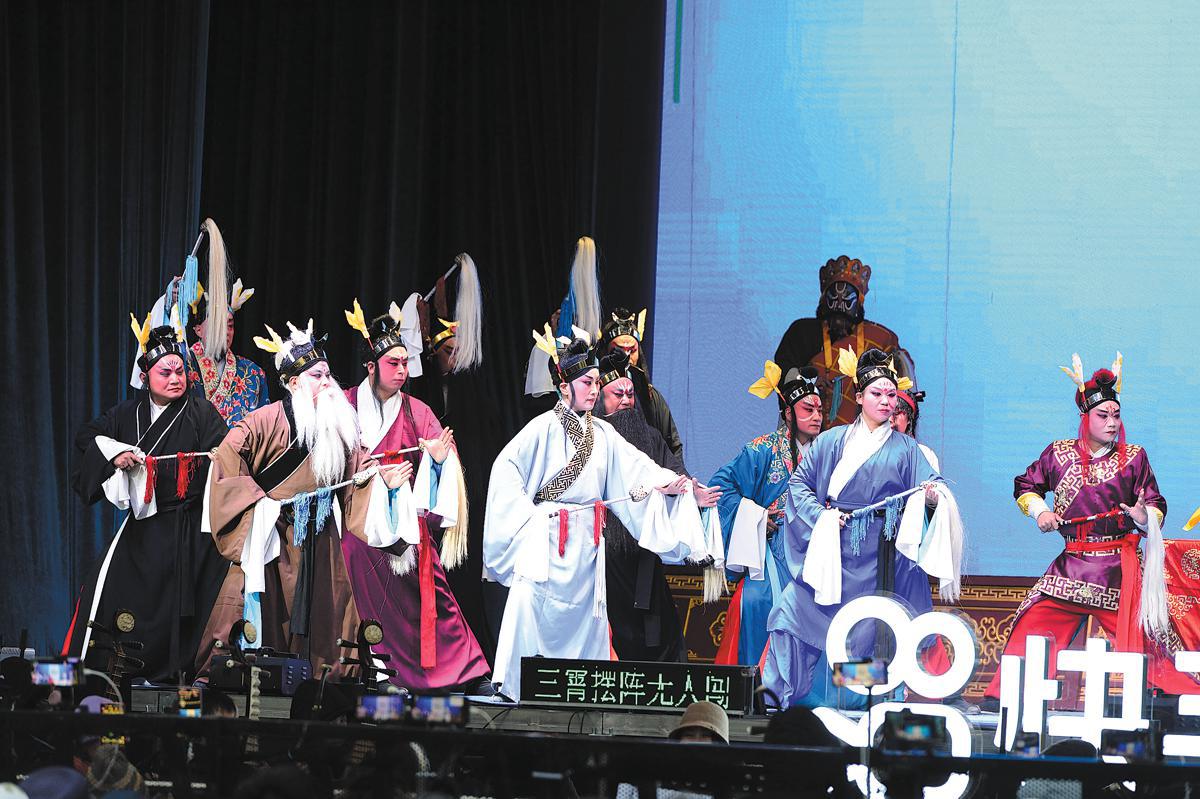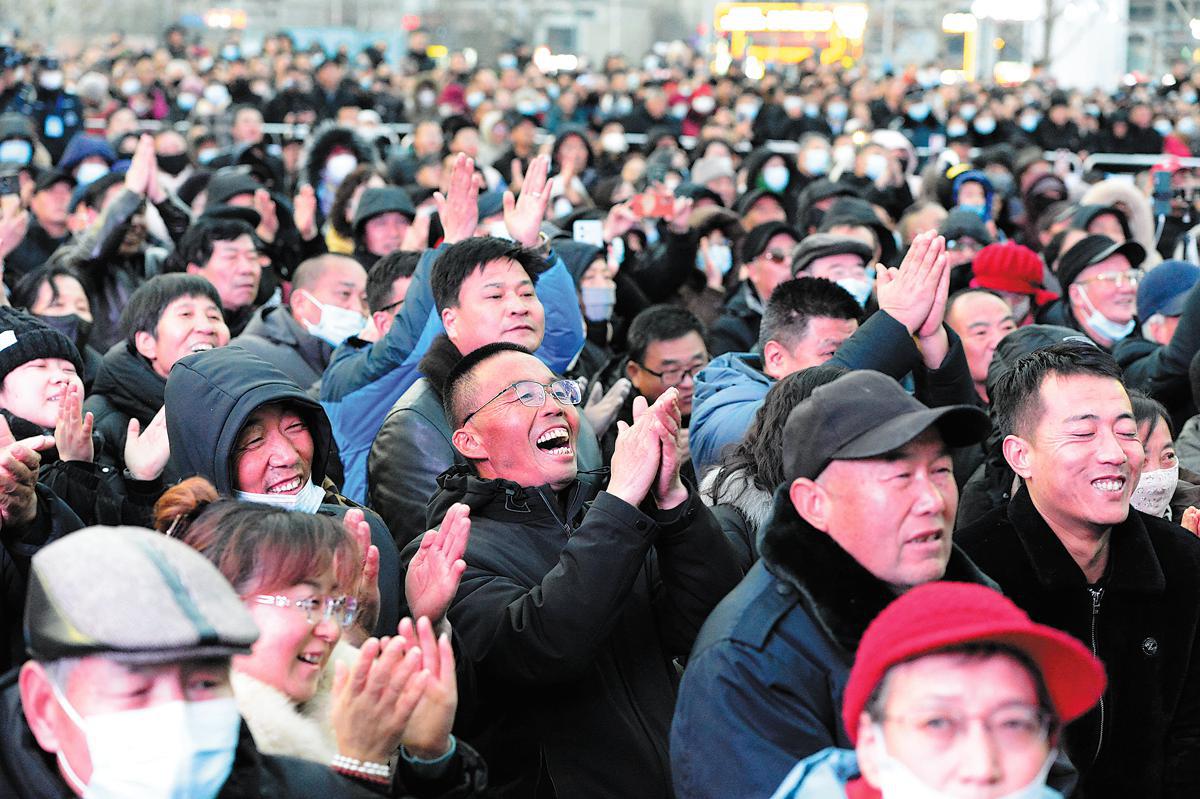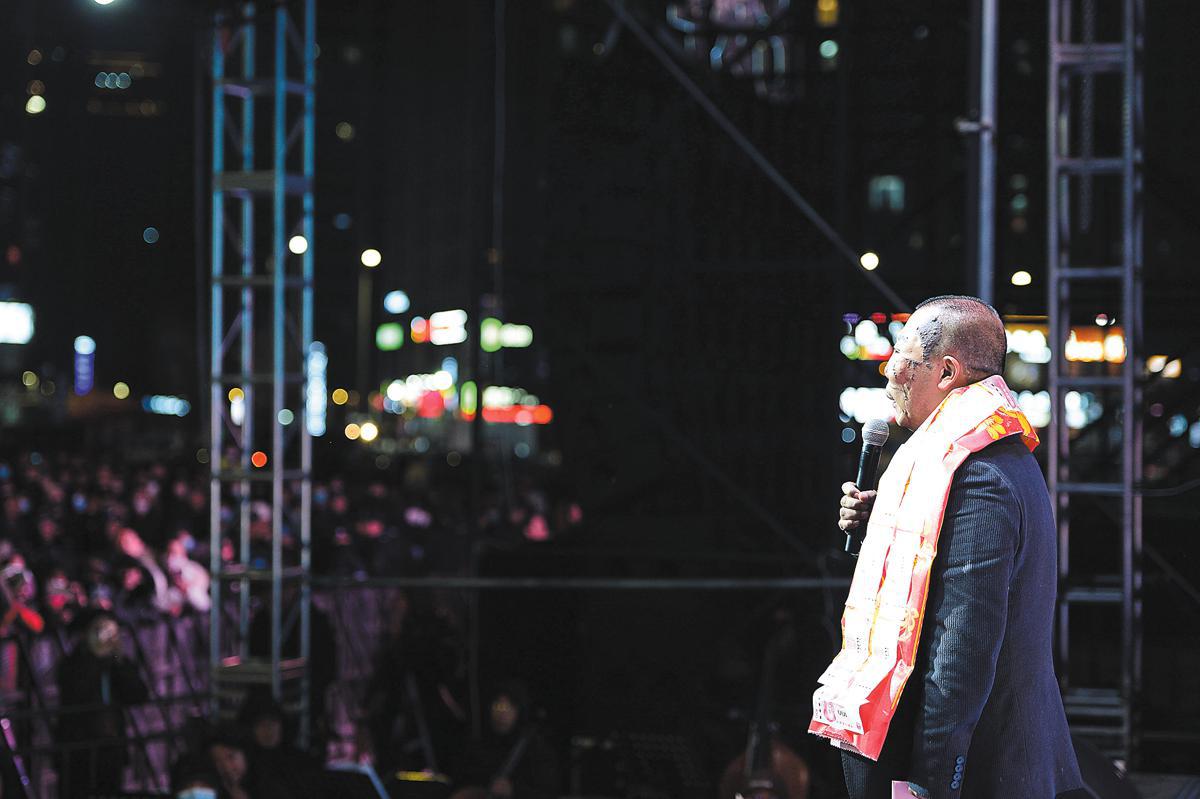
An Wan's Qinqiang Opera troupe stages a performance in Xi'an, Shaanxi province. PEI QIANG/FOR CHINA DAILY
It's hard to fathom that more than 2,000 years after Qinqiang Opera was ever performed in China, that social media and technology would be driving its continued popularity, especially in the northwest of the country.
Driven by 1.27 million followers on Chinese social media platform Kuaishou, 47-year-old Qinqiang Opera performer An Wan and his 158-member troupe, completed a sold-out tour in December across Shaanxi and Gansu provinces, and the Ningxia Hui autonomous region.
Playing in countless venues across Northwest China, audience numbers averaged around 300 to 500 people in rural areas, and as many as 10,000 in big cities such as in Lanzhou, Gansu province.
The livestreamed shows on this latest tour have been viewed more than 140 million times.
What has propelled their success has been the use of short-video platforms, dating back to 2016, which has enabled them to grow a fan base for the traditional performance art online, as well as the introduction of modern elements into the live shows.
Traditionally, Qinqiang Opera originated from local folk songs and dance forms in Shaanxi and Gansu provinces. According to historical records, the opera first appeared in the Qin Dynasty (221-206BC) and remained popular in the Qing Dynasty (1644-1911). Its stories feature such themes as war, the fight between the loyal and the treacherous, and the struggle against oppression.
A key element of this opera style is its joyous and sad tunes, whereby the audience joins in to create a powerful atmosphere.
"Since the latest performances in Xi'an, I've gained nearly 300,000 new fans online, mostly from people in their 20s and 30s. I'm thrilled that so many young people are now interested in Qinqiang Opera," An said.

Audiences enjoy a Qinqiang Opera show by An Wan's troupe in Xi'an. PEI QIANG/FOR CHINA DAILY
Like other traditional opera arts, Qinqiang Opera has long faced various challenges brought on by changing times.
In a 2014 report in Chinese Culture Daily, Liu Kuanren, then director of the Shaanxi provincial department of culture, said: "Although every county in Shaanxi has its own Qinqiang Opera troupe, one-third of them are actually defunct. Many actors struggle to make a living, and the situation of local opera troupes is concerning."
He also noted that there are many issues to consider for the inheritance and development of Qinqiang Opera.
Echoing Liu, An said: "There are over 3,000 Qinqiang Opera repertoires, but due to various reasons, only a few dozen are widely circulated. Without protection and proper transmission, many repertoires are at risk of being lost."
As an experienced Qinqiang actor who has dedicated himself to the art form since he was 12, An has played his part in revitalizing the show.
"Qinqiang Opera has been lukewarm for many for a long time. The main reason is that we've been following the same path, merely tracing the footsteps of our predecessors without innovations. So I thought, why not shake things up a bit," he said.
An and his troupe preserved the essence of classic plays while adjusting melodies and rhythms, such as slowing the pace of recitation and reducing some dialect elements. At the same time, the troupe incorporated effects from Western-style concerts, introducing elements such as smoke, snow and fire machines to create a more vibrant setting.
They expanded their orchestra to 40 members, incorporating Western music and rock elements to blend the ancient Qinqiang style with modern artistic expressions.
"We even considered adding elements like rap and DJs that young people like, allowing them to feel the rhythm on stage," he said.
"Many young people in the audience are now excited. They find the music beautiful," he added.

An thanks the audience after a performance. PEI QIANG/FOR CHINA DAILY
The troupe's young actors also support this transformation of embracing the younger generation.
Bai Mengmeng, an 18-year-old said, "We must uphold traditional culture but also innovate to cater to young people's needs, because the present era belongs to the youth."
The livestreams have been crucial to getting a younger following from the beginning, An said, adding that during the streams he'd explain Qinqiang techniques, share stories about the art form and highlight the unique charm of the opera.
"As my fan base grew, I formed my own hundred-member troupe and started livestreaming performances," he said.
An's success has been remarkable, with sellout performances wherever the troupe goes.
Wang Peng, a 13-year-old fan from Hubei province said: "I love Qinqiang Opera very much and also admire An Wan. He is a brilliant actor and can convey his inner feelings and emotions through singing, helping young people better understand the art and continue its legacy."
Data released by Kuaishou shows a rising interest in Qinqiang Opera.
In December, views on the platform related to Qinqiang increased by 65 percent compared to the previous year and by 46 percent compared to June.
He Xiaozu, head of the Gansu Provincial Department of Culture and Tourism, said, "It is not easy for private troupes to achieve what they have today within a year.
"Preserving the original flavor of Qinqiang, rediscovering lost plays and cultural traditions, and organizing nearly lost scripts is crucial."
Contact the writers at zhaoruinan@chinadaily.com.cn